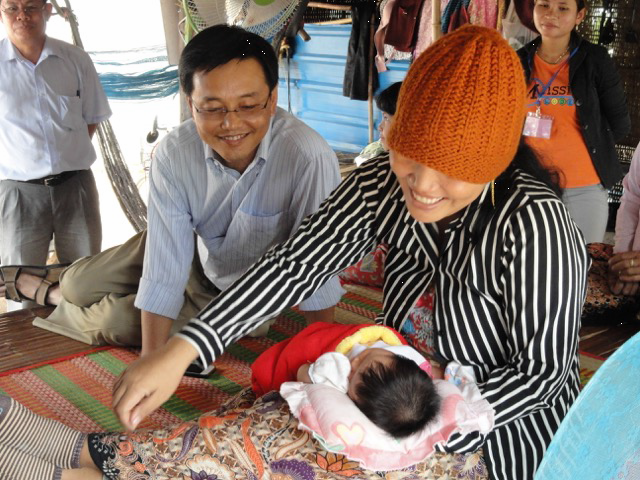|
PARTNERSHIPS FOR ENHANCED ENGAGEMENT IN RESEARCH (PEER) HEALTH
Cycle 1
Principal Investigator: Chivorn Var, National Institute of Public Health (NIPH), Cambodia NIH-Supported Collaborator: Robert Oberhelman, Tulane School of Public Health and Tropical Medicine Title of NIH Award: Inter American Training for Innovations in Emerging Infectious Diseases Project Dates: October 2014 - March 2018 Project Overview:
Newborn mortality remains unacceptably high in Cambodia, despite reductions in maternal and under-five mortality rates. Evidence suggests that a significant proportion of newborn deaths globally and in Cambodia are due to infections and sepsis, highlighting a critical area for intervention. The recent increase in births at Health Centers, which may not be adequately prepared for higher caseloads, has likely contributed to substandard hygiene practices and delays in referrals. The project aimed to implement and evaluate an integrated intervention to reduce newborn mortality and morbidity by enhancing infection control during the perinatal period, improving detection of newborn illnesses, and facilitating prompt referrals to appropriate care. The project had two primary objectives: (1) to enhance infection control practices among staff at selected Health Centers and train health workers to communicate infection control messages to pregnant women and new mothers; (2) to improve the referral process for sick newborns by Village Health Support Group (VHSG) volunteers and Health Center staff through better recognition of danger signs and reducing the time between identifying these signs and seeking care at an appropriate health facility. Additionally, the study aimed to investigate the causes of sepsis among infants in specific Health Center catchment areas. Employing an experimental design, the study utilized mixed methods, including formative qualitative research, a stepped-wedge cluster randomized intervention trial, and process evaluation. The anticipated outcomes of this study include generating data to inform policy actions aimed at improving newborn survival not only in Cambodia but also in similar settings facing comparable health challenges. The findings may support the potential scale-up of an integrated community-facility care model for newborns. Final Summary of Project Activities
 | Principal Investigator and Project Coordinator observed project staff interviewing new delivery mothers in Tropaing Snor & Prey Changreak villages.
|
This project completed all proposed activities. 114 Health Center staff (HC staff) and 505 Village Health Support Group (VHSG) members were trained to provide education/counseling to pregnant women on newborn care. Educational materials (two types of flip-charts and four types of short videos) were developed for use during training of Health Center staff and VHSGs. These materials will continue to be used by trainers as they continue to disseminate the materials for wider use. The results from the study indicated positive impacts on improving infection control behavior by the HC staff, as well as improved knowledge on hygiene and newborn danger signs by both HC and VHSGs. VHSGs in the intervention group conducted more home visits than their peers in the control group (through the existing data, the team still needs to look into the quality of the visits and continue to share the findings). Mothers in the intervention group received health messages from VHSGs more than their peers in the control group, but the intervention alone does not change the intended behaviors among the mothers. The team found that other factors such as availability of infrastructure at the household level and motorbike/transportation means contribute to the practices of the positive behaviors including prompt referral of sick newborns. Knowledge and attitude will have little impact on the practices unless there are other enabling factors. This is an important point to share with relevant policy makers/implementer on a comprehensive approach (not only focus on knowledge and attitude, but also enabling factors) toward infection control, hygiene, and referral of newborn care. Publications
Alessandra N. Bazzano, Chivorn Var, Francoise Grossman, Richard A. Oberhelman, Use of Camphor and Essential Oil Balms for Infants in Cambodia, Journal of Tropical Pediatrics, Volume 63, Issue 1, February 2017, Pages 65–69, https://doi.org/10.1093/tropej/fmw013Bazzano AN, Taub L, Oberhelman RA, Var C. Newborn Care in the Home and Health Facility: Formative Findings for Intervention Research in Cambodia. Healthcare. 2016; 4(4):94. https://doi.org/10.3390/healthcare4040094Bazzano A, Oberhelman R, Storck Potts K, Taub L, Var C. What health service support do families need for optimal breastfeeding? An in-depth exploration of young infant feeding practices in Cambodia. Int J Womens Health. 2015;7:249-257. https://doi.org/10.2147/IJWH.S76343Bazzano AN, Oberhelman RA, Potts KS, Gordon A, Var C. Environmental Factors and WASH Practices in the Perinatal Period in Cambodia: Implications for Newborn Health. International Journal of Environmental Research and Public Health. 2015; 12(3):2392-2410. https://doi.org/10.3390/ijerph120302392
Var, C., Bazzano, A.N., Srivastav, S.K. et al. Newborn Infection Control and Care Initiative for health facilities to accelerate reduction of newborn mortality (NICCI): study protocol for a randomized controlled trial. Trials 16, 257 (2015). https://doi.org/10.1186/s13063-015-0771-5
Var, C.; Oberhelman, R.A.; Shu, T.; Leang, S.; Duggal, R.; Le, J.; Bazzano, A.N. A Linked Community and Health Facility Intervention to Improve Newborn Health in Cambodia: The NICCI Stepped-Wedge Cluster-Randomized Controlled Trial. Int. J. Environ. Res. Public Health 2020, 17, 1559. https://doi.org/10.3390/ijerph17051559 Health Cycle 1 Recipients
| 



